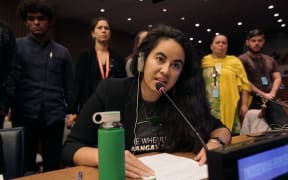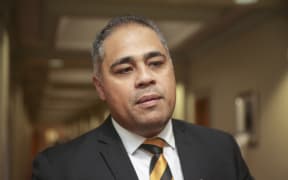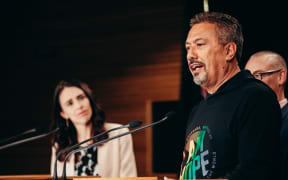Whānau Ora minister Peeni Henare can kiss Māori progress goodbye if he continues to allow other agencies to dip into its funding, the organisation's head has warned.
It comes as distinguished Māori leaders seek an urgent Waitangi Tribunal hearing over the government's handling of Whānau Ora funding.
The Whānau Ora policy allows Māori to control the funding and delivery of social services through its three Māori-led commissioning agencies.
It received an $80m funding boost over four years in the 2019 Budget, but North Island commissioning agency chair Merepeka Raukawa-Tait said not all of that money was going to Whānau Ora.
"From what we have seen, particularly in the last 12 months, we believe that the government is starting to undermine Whānau Ora," Raukawa-Tait told RNZ'sCheckpoint.
Raukawa-Tait said she was seeing funding being withdrawn, with government agencies adopting the 'Whānau Ora' brand.
"We do know that the additional funding has gone into government agencies and to a new initiative that they're calling the 'whānau ora initiative'.
"They're using that and saying that's the way they can develop policy that will be good for whānau. That money, the additional money, is actually needed by Whānau Ora, not by a government department, any government department - they have never known what's good for Māori."
She - along with Dame Naida Glavish, Dame Tariana Turia, Lady Tureiti Moxon and Dame Iritana Tawhiwhirangi - wrote to Prime Minister Jacinda Ardern in November last year expressing their concerns, but said they had not had a response.
They are now seeking an urgent Waitangi Tribunal hearing, claiming the government has breached the Treaty of Waitangi by refusing to adequately and transparently fund Whānau Ora.
Of the $20m extra funding Whānau Ora was promised last year, only about $5m was received by the commissioning agencies.
Raukawa-Tait said that did not make any sense, and she had a message for the Minister of Whānau Ora, Peeni Henare.
"Be the minister that we want to have confidence in. At this present moment we do not.
"If he does not understand his role and our expectations of him than you can kiss Māori progress goodbye for the next two decades."
She said if he continued to allow government agencies to use its funding, Whānau Ora faced destruction by stealth.
Henare denied any of the Whānau Ora funding was going to other government agencies, and said the move was politically motivated.
He said the three commissioning agencies would receive a further $42m and the rest had been ear-marked for new Whānau Ora initiatives - including one to support people who had whānau in prison.
"We've held on to some of the money ... to allow us to explore how we might be able to support Whānau Ora," he said.
"Some of the money has already been allocated to growing whānau ora through commissioning, some of the money currently sits there while the co-design of new initiatives is under way - and, namely, the one with the corrections agencies.
"That money has not gone to Corrections, a correctional facility or the Minister for Corrections. I can guarantee that none of the money has gone back into government pockets or government agencies."
Multiple reviews into Whānau Ora, including an independent review in 2018 have found the policy works, but its funding and resourcing are not enough to meet demand in some areas.
Henare said it did not matter where the support was coming from as long as whānau were getting the help they needed.
"My job isn't to please commissioning agencies, my job is to make sure that whānau - whereever they might be - get the whānau ora support they deserve.
"We made it clear that in order for whānau ora to grow off the back of the review that we were to push whānau ora to have support from other government agencies."
Lady Tureiti Moxon, the director of a leading Whānau Ora health provider in Waikato, said the minister should be backing the Whānau Ora Commissioning model which had been proven to change people's lives.
"We can look after our own people, we can do this for ourselves, but if the government is going to hold back funding there's no way that we can actually develop and grow ourselves because the demand is huge.
"You do what you can with the resourcing that we're given but when you compare it to what other government agencies are getting, it's miniscule."
The claimants said they wanted the Waitangi Tribunal to recommend urgent systemic changes to the way Whānau Ora funding decisions are made so further prejudice against Māori could be avoided.







